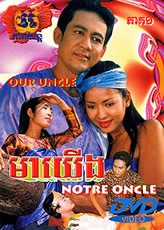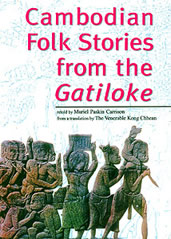 |
 |
| Southeast Asian Literature in Translation |
| |
|
|
|
|
The purpose of this course (IP361) is to impart a scholarly appreciation of the literatures of Khmer insofar as these are limited through translation (book/handout/movie) and to acquaint the student with methods and problems of literary studies relating to Cambodia.
Secondary purpose is to provide background for further literary studies, particularlly those based on venacular sources, and to develop the student's ability to exploit literature as a reflection of local Khmer cultures. |
| |
|
|
|
|
 Class Materials Class Materials  |
| DVDs |
     |
     |
| |
| Books |
| |
 |
◄ These tales from the Gatiloke, a collection of ancient
Cambodian folk stories, have their origin in the gentle teachings of
Buddhist monks. There are stories of peasants whose quick wit saves
them from thieves and scoundrels, and tales of clever women who foil
traps set for them by greedy nobles. Humorous stories ridicule unjust
rulers and tell of the absurd predicaments of people. Animal fables
teach lessons in justice, wisdom, and compassion. Some of the stories
in this collection have been passed on by word of mouth from generation
to generation for thousands of years; others are more modern Cambodian
classics. All portray the heart and soul of the Cambodian people. |
 |
 |
◄ Oukoubah is an Arabic word meaning "justice." This book explores the genocide of the Cham ethnic group, making a case that the Cham, who are Muslim, were killed at a rate that was double to nearly triple that of the general population. The author provides evidence showing that the Cham comprised 10% of Cambodia's population (roughly 700,000 people) before 1975, but numbered only 200,000 after the fall of the Khmer Rouge regime in 1979.
The author presents case studies of 13 Cham prisoners at the infamous Tuol Sleng Prison, known to the Khmer Rouge as "Office S-21." The prisoners included seven Khmer Rouge soldiers, two Khmer Republic Government officials, a student, a fisherman, a Khmer Rouge interrogator at S-21, and a peasant who fled the regime. All were taken from S-21 to the "killing fields" of Choeung Ek and executed. |
 |
|
|
|
|
 |
◄ In 1975, U Sam Oeur and his family along with 2.8 million citizens of Phnom Penh were driven out of the city by the Khmer Rouge. During the next four years, the family survived life in six different concentration camps.
Sacred Vows retells the recent terror of Cambodia and the beauty of its culture. A survivor of the Pol Pot regime, Oeur hopes to inspire young Cambodians to reacquaint themselves with their heritage and make it once again vibrant.
Using myths, stories, prophecies, and history of the tradition as ironic counterpoint to Cambodia's present-day situation, Oeur foretells freedom's imminent return. Unlike the monotone chanting style of Khmer poetry, Oeur's style is distinct in its operatic and emotionally charged qualities. Sacred Vows is a mesmerizing call to freedom.
|
|
 |
◄ Tum Teav is the tragic love story of a talented novice monk named Tum and a beautiful adolescent girl named Teav. Well known throughout Cambodia since at least the middle of the 19 th century, the story has been told in oral, historical, literary, theatre, and film versions. This monograph contains the author’s translation of the Venerable Botumthera Som’s version. It also examines the controversy over the poem’s authorship and its interpretation by literary scholars and performers in terms of Buddhism and traditional codes of conduct, abuse of power, and notions of justice. |
|
 |
|
 |
|